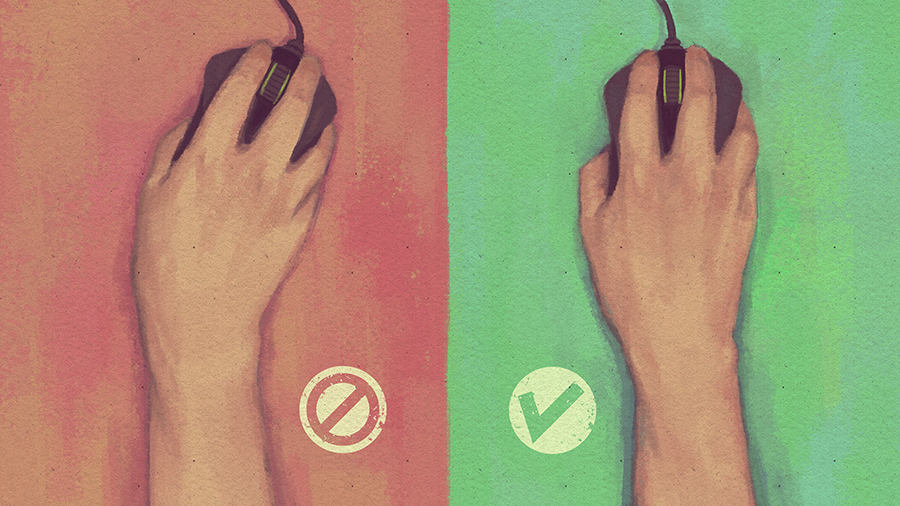Ask a medic: Why does my wrist hurt?
The most important pieces of gaming gear you own are your hands. Learn why they might be yelling at you.
I’ve been spending more time gaming because of the whole global pandemic thing and my hands and wrists have been hurting more. Is that just because I’ve been playing more, or is there something more serious I should be worried about?

Caitlin McGee is a physical therapist with a background in neuroscience and exercise/sport science. She is the co-owner and performance and esports medicine director of 1HP, a company that provides health and performance services to esports players, teams, and organizations. She has been working in esports medicine for 6 years.
It sounds like you're dealing with some repetitive strain issues. Strain is a combination of how much work you ask the tissues in your body to do and how long you ask them to work. It can involve quite a few factors: What position is your wrist resting in? How conditioned are the muscles that move and stabilize it? How much moving do you do at your wrist? How fast and how frequent are the movements? How much force do you use?
In general, the more time you spend doing work with the same tissues—muscles, tendons, joints—the more strain those tissues are under. That increased strain doesn’t have to result in injury, but it can if your body isn’t prepared to take on that amount of strain. Think of how a marathon runner trains: They don’t just go out and run a marathon, they spend months building up their mileage and their pace slowly so that their tissues can adapt to the increased load bit by bit. Gaming may not be as strenuous as marathon running, but the same principles apply to the tissues in your hands, wrists, and arms.

In this particular case, given the general descriptor of “hurting more” and the fact that you’ve had a big increase in the time you spend gaming, you’ve probably put a little more strain on your tissues than they were prepared for. The solution for that isn’t to stop entirely. The solution here is to start adding in ways of building up your muscles and tendons and ways of helping them recover. If you continually strain those tissues without giving them time to adapt, you can end up with a repetitive strain injury.
“Repetitive strain” is pretty much what it sounds like: you've put the same strain on the same tissues repetitively, past their ability to tolerate and adapt to it.
I like to use the analogy of a heat meter. We’re all familiar with overheat mechanics in games, where a weapon’s heat slowly builds up over time until it reaches a point where you can no longer use it until it’s had a reset or cooldown period. Your tissue is much like that. As you ask those muscles to contract and those tendons to pull on bones, your body accumulates strain. When you exhaust your muscles and tendons, you experience pain and injury. In other words, you’ve overheated.
There are a number of things you can do to address the buildup of strain in your muscles and tendons. You can expand the “heat capacity” of your tissues by exercising, which improves strength and endurance. You can slow down the rate of strain, how fast you “build up heat”, by hydrating well, getting adequate sleep, and eating balanced meals. You can pause or even reverse some of the “heat buildup” by building breaks into your schedule to stretch and move around. All of those things decrease your likelihood of overheating, or developing repetitive strain injuries.
The biggest gaming news, reviews and hardware deals
Keep up to date with the most important stories and the best deals, as picked by the PC Gamer team.
Let’s take this out of the realm of analogies and get a little more concrete. Repetitive strain injuries present differently depending on what tissues are affected, and I’ll go over a few common presentations here:
| Tissue Type | Injury Type | Characteristics |
|---|---|---|
| Muscle | Trigger point | Tight “knot” of muscle, tender to the touch, causes radiating or referred pain to other nearby tissues (e.g. a trigger point in the upper trapezius muscle can refer pain up the side of the neck and cause headaches) |
| Muscle | Muscle strain | Swelling, weakness, pain at rest; most commonly result from sudden increase in duration, intensity, and frequency of activity. Range from mild (full range of motion, minimal loss of strength) to severe (muscle tear, resulting in significantly decreased strength) |
| Tendon | Tendinitis/tendinopathy | Pain at beginning of activity which at first improves with activity, then worsens over time; sharp pain during early stages, dull ache as it becomes more chronic; swelling; limited range of motion; may have tingling in generalized region |
| Tendon | Tenosynovitis | Pain that worsens with activity, localized swelling, pain along length of tendon |
| Nerve | Compression | Usually secondary to other conditions that cause inflammation and irritation around the nerve; numbness, tingling, or decreased sensation in specific regions that the nerve goes to |
So how do you separate out “just overdoing it a little” from repetitive strain injuries?
First, consider how long you’ve had symptoms. The shorter the duration, the more likely that this is just an acute issue that doesn’t have to turn repetitive or chronic. Second, consider how well those symptoms respond to “cooldown” mechanisms like stretching and rest breaks. If those simple interventions resolve your pain, your body likely just needed a little more help with adapting to the strain placed on it, and you’re ready to game on. Check out some options for improving strength and endurance here, here, and here.
If your symptoms resolve reasonably quickly (within 1-2 weeks of making ergonomic, exercise, and warmup/cooldown changes), great! If your symptoms persist more than two weeks and aren’t improving at home, or if they worsen in that time, it's worth talking to a professional like a medical doctor, a physical therapist, or an occupational therapist.
This article contains information about injuries and injury prevention, but does not constitute specific medical advice. You understand and acknowledge that all users of this website are responsible for their own medical care, treatment and oversight. This article is in no way intended to replace professional medical care or attention by a qualified practitioner and should not be used as a basis for definitive diagnosis or choice of treatment. Future US, Inc does not recommend or endorse any specific tests, products, procedures or opinions that may be provided on any linked websites. Reliance on any information on this website or any linked website is solely at your own risk.

